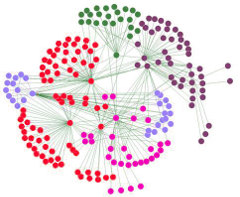Our routers need to remove the "internet" from the "internet of things" to stop DDOS
Submitted by brad on Sun, 2016-10-23 15:33I frequently say that there is no "internet of things." That's a marketing phrase for now. You can't go buy a "thing" and plug it into the "internet of things." IoT is still interesting because underneath the name is a real revolution from the way that computing, sensing and communications are getting cheaper, smaller and using less power. New communications protocols are also doing interesting things.
We learned a lesson on Friday though, about why using the word "internet" is its own mistake. The internet -- one of the world's greatest inventions -- was created as a network of networks where anything could talk to anything, and it was useful for this to happen. Later, for various reasons, we moved to putting most devices behind NATs and firewalls to diminish this vision, but the core idea remains.
Attackers on Friday made use of growing collection of low cost IoT devices with low security to mount a DDOS attack on DYN's domain name servers, shutting off name lookup for some big sites. While not the only source of the attack, a lot of attention has come to certain Chinese brands of IP based security cameras and baby monitors. To make them easy to use, they are designed with very poor security, and as a result they can be hijacked and put into botnets to do DDOS -- recruiting a million vulnerable computers to all overload some internet site or service at once.
Most applications for small embedded systems -- the old and less catchy name of the "internet of things" -- aren't at all in line with the internet concept. They have no need or desire to be able to talk to the whole world the way your phone, laptop or web server do. They only need to talk to other local devices, and sometimes to cloud servers from their vendor. We are going to see billions of these devices connected to our networks in the coming years, perhaps hundreds of billions. They are going to be designed by thousands of vendors. They are going to be cheap and not that well made. They are not going to be secure, and little we can do will change that. Even efforts to make punishments for vendors of insecure devices won't change that.
So here's an alternative; a long term plan for our routers and gateways to take the internet out of IoT.
Our routers should understand that two different classes of devices will connect to them. The regular devices, like phones and laptops, should connect to the internet as we expect today. There should also be a way to know that the connecting devices does not want regular internet access, and not to give it. One way to do that is for the devices to know about this, and to convey how much access they need when they first connect. One proposal for this is my friend Eliot Lear's MUD proposal. Unfortunately, we can't count on devices to do this. We must limit stupid devices and old devices too.




 Of course, for the social site to aggregate and use this data for its own purposes would be a gross violation of many important privacy principles. But social networks don't actually do (too many) things; instead they provide tools for their users to do things. As such, while Facebook should not attempt to detect and use political data about its users, it could give tools to its users that let them select subsets of their friends, based only on information that those friends overtly shared. On Facebook, you can enter the query, "My friends who like Donald Trump" and it will show you that list. They could also let you ask "My Friends who match me politically" if they wanted to provide that capability.
Of course, for the social site to aggregate and use this data for its own purposes would be a gross violation of many important privacy principles. But social networks don't actually do (too many) things; instead they provide tools for their users to do things. As such, while Facebook should not attempt to detect and use political data about its users, it could give tools to its users that let them select subsets of their friends, based only on information that those friends overtly shared. On Facebook, you can enter the query, "My friends who like Donald Trump" and it will show you that list. They could also let you ask "My Friends who match me politically" if they wanted to provide that capability.
 Recordings of mundane driving activity are less exciting and will be easier to gather. Real world incidents are rare and gold for testing. The sharing is not as golden, because each vehicle will have different sensors, located in different places, so it will not be easy to adapt logs from one vehicle directly to another. While a vehicle system can play its own raw logs back directly to see how it performs in the same situation, other vehicles won't readily do that.
Recordings of mundane driving activity are less exciting and will be easier to gather. Real world incidents are rare and gold for testing. The sharing is not as golden, because each vehicle will have different sensors, located in different places, so it will not be easy to adapt logs from one vehicle directly to another. While a vehicle system can play its own raw logs back directly to see how it performs in the same situation, other vehicles won't readily do that. Make no mistake, the cost will be real. The cost of regulations is rarely known in advance but it is rarely small. Regulations slow all players down and make them more cautious -- indeed it is sometimes their goal to cause that caution. Regulations result in projects needing "compliance departments" and the establishment of procedures and legal teams to assure they are complied with. In almost all cases, regulations punish small companies and startups more than they punish big players. In some cases, big players even welcome regulation, both because it slows down competitors and innovators, and because they usually also have skilled governmental affairs teams and lobbying teams which are able to subtly bend the regulations to match their needs.
Make no mistake, the cost will be real. The cost of regulations is rarely known in advance but it is rarely small. Regulations slow all players down and make them more cautious -- indeed it is sometimes their goal to cause that caution. Regulations result in projects needing "compliance departments" and the establishment of procedures and legal teams to assure they are complied with. In almost all cases, regulations punish small companies and startups more than they punish big players. In some cases, big players even welcome regulation, both because it slows down competitors and innovators, and because they usually also have skilled governmental affairs teams and lobbying teams which are able to subtly bend the regulations to match their needs.
 Here are some basic models of cost. I compare a low-cost 1-2 person robotaxi, a higher-end 1-2 person robotaxi, a 4-person traditional sedan robotaxi and the costs of ownership for a private car, the Toyota Prius 2, as
Here are some basic models of cost. I compare a low-cost 1-2 person robotaxi, a higher-end 1-2 person robotaxi, a 4-person traditional sedan robotaxi and the costs of ownership for a private car, the Toyota Prius 2, as  In other Uber news, Uber has announced it will sell randomly assigned Uber rides in their self-driving vehicles in Pittsburgh. If your ride request is picked at random (and because it's in the right place) Uber will send one of their own cars to drive you on your ride, and will make the ride free, to boot. Of course, there will be an Uber safety driver in the vehicle monitoring it and ready to take over in any problem or complex situation. So the rides are a gimmick to some extent, but if they were not free, it would be a sign of another way to get customers to pay for the cost of testing and verifying self-driving cars. The free rides, however, will probably actually cause more people to take Uber rides hoping they will win the lottery and get not simply the free ride but the self-driving ride.
In other Uber news, Uber has announced it will sell randomly assigned Uber rides in their self-driving vehicles in Pittsburgh. If your ride request is picked at random (and because it's in the right place) Uber will send one of their own cars to drive you on your ride, and will make the ride free, to boot. Of course, there will be an Uber safety driver in the vehicle monitoring it and ready to take over in any problem or complex situation. So the rides are a gimmick to some extent, but if they were not free, it would be a sign of another way to get customers to pay for the cost of testing and verifying self-driving cars. The free rides, however, will probably actually cause more people to take Uber rides hoping they will win the lottery and get not simply the free ride but the self-driving ride. Consider here in California, which is very solidly for Clinton. Nate Silver rates it as 99.9% (or higher) to go for Clinton. A vote for Clinton or Trump here is wasted. It adds a miniscule proportion to their totals. Clinton will fetch around 8 million votes. You can do the un-noticed thing of making it 8 million and 1, and you'll bump her federally by an even tinier fraction. Your vote can make no difference to the result (you already know that) and nor will it be noticed in the totals. You're throwing it away, getting an insignificant benefit for its use.
Consider here in California, which is very solidly for Clinton. Nate Silver rates it as 99.9% (or higher) to go for Clinton. A vote for Clinton or Trump here is wasted. It adds a miniscule proportion to their totals. Clinton will fetch around 8 million votes. You can do the un-noticed thing of making it 8 million and 1, and you'll bump her federally by an even tinier fraction. Your vote can make no difference to the result (you already know that) and nor will it be noticed in the totals. You're throwing it away, getting an insignificant benefit for its use.
 But it is a contest, and while it looks like
But it is a contest, and while it looks like